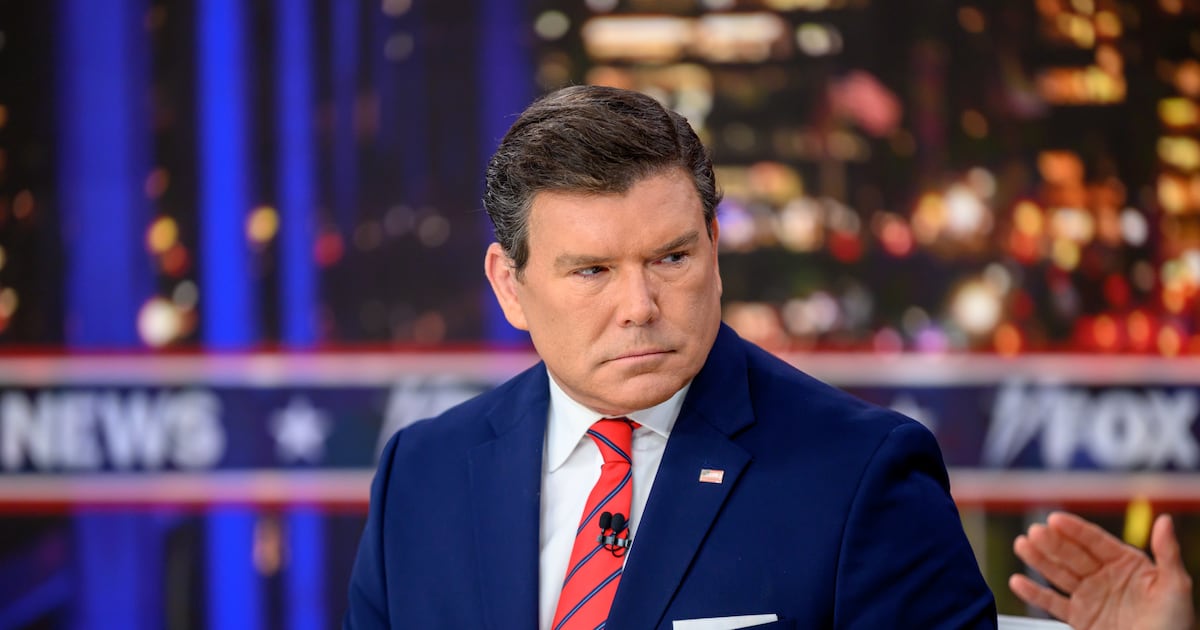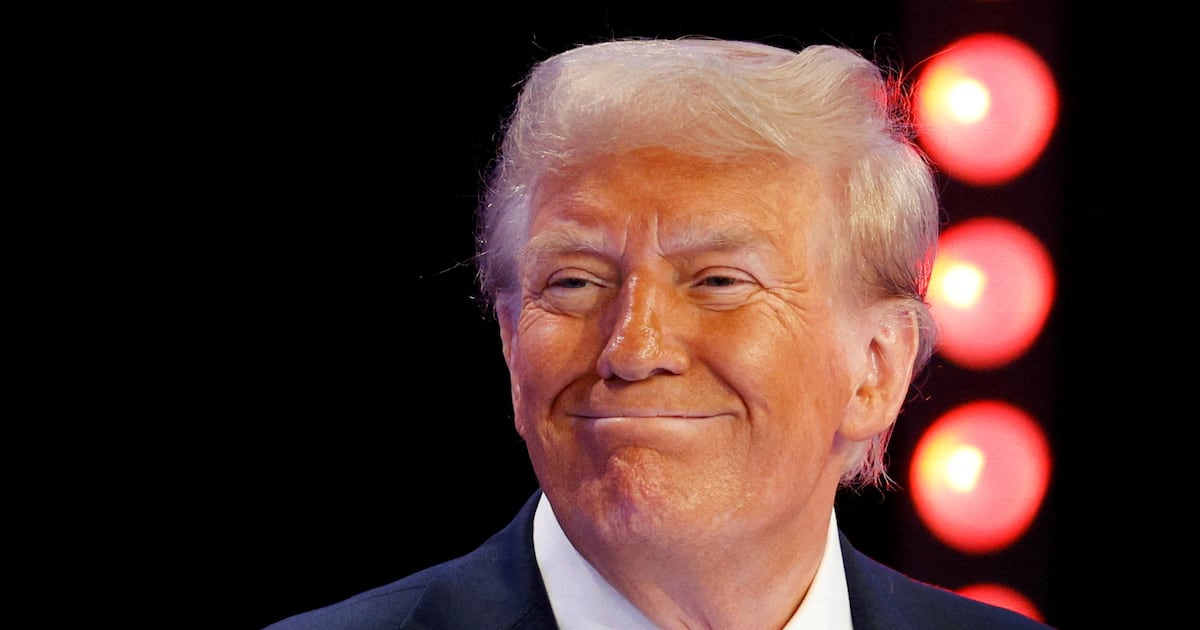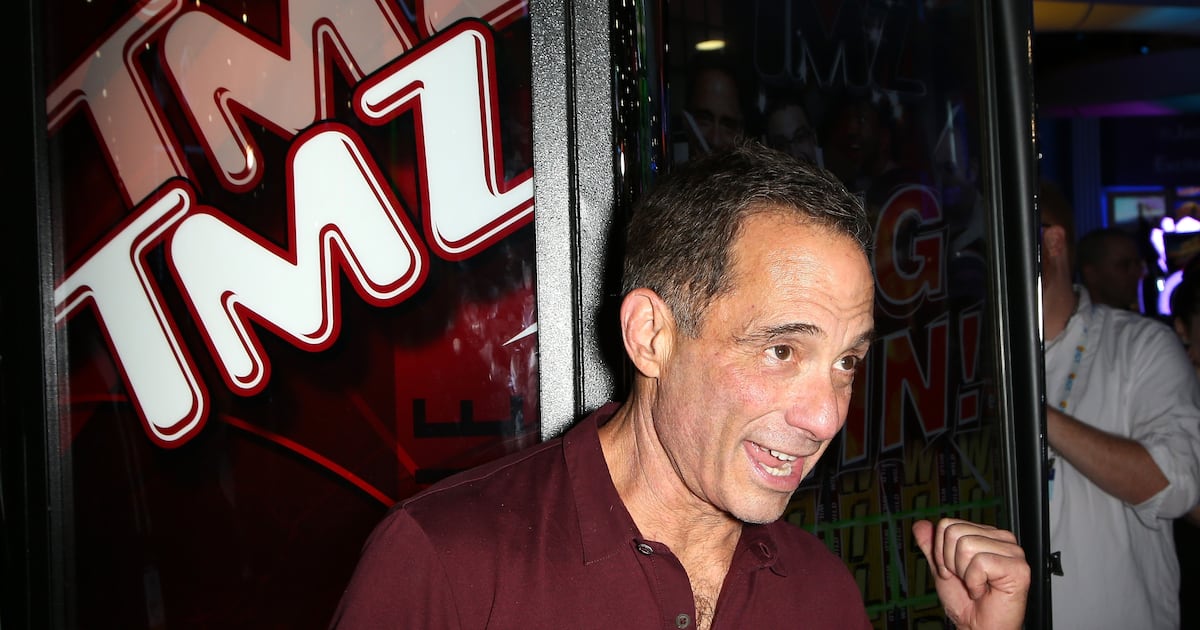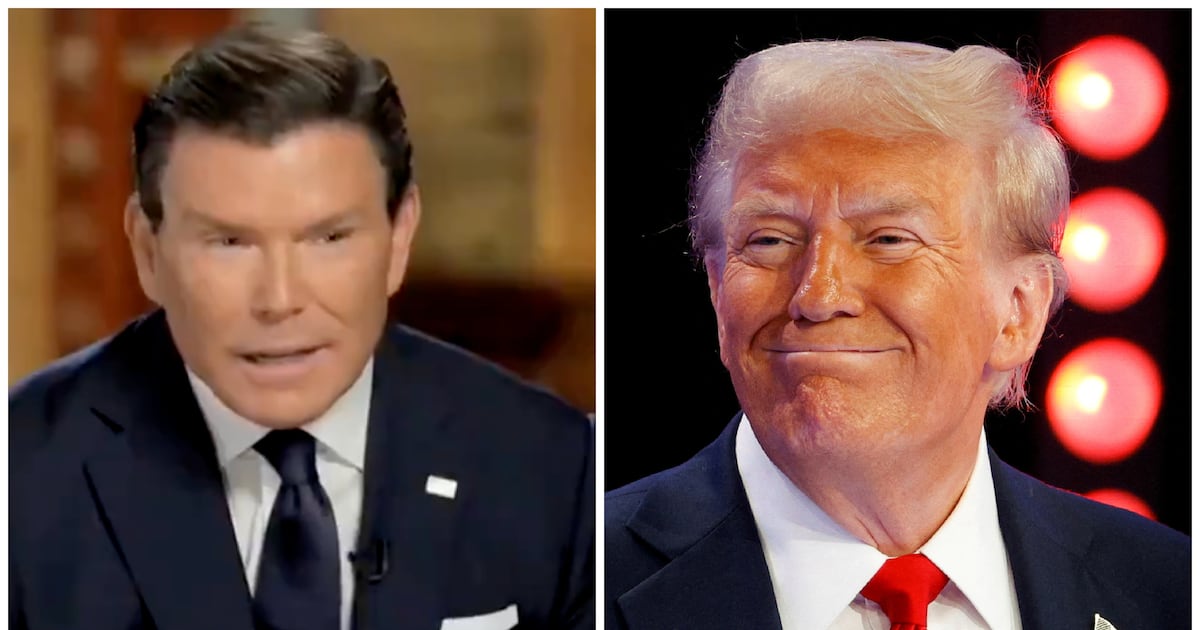When television critics Alan Sepinwall and Matt Zoller Seitz speak about HBO’s legendary series The Sopranos, they can say without fear of contradiction: “We told you so.” From The Sopranos' debut on January 10, 1999, both longtime television critics consistently evangelized about the show’s acting talent and production quality.
By February 2, 1999, Seitz had already pronounced James Gandolfini’s Tony Soprano “one of the richest roles in TV history—maybe as rich a role as any actor has ever had.” After 20 years, bold statements like that will look ridiculous or brilliant. Seitz called that shot.
“It’s easy to put Gandolfini on TV’s Mt. Rushmore,” Sepinwall told The Daily Beast, along with Andre Braugher or Bryan Cranston, but he rose above. Right from the start of The Sopranos, “what he was doing was so special, so unique, so powerful.”
ADVERTISEMENT
In their new book, The Sopranos Sessions, Seitz and Sepinwall take a well-earned opportunity to reexamine their two decades of investment with the show. They offer in-depth perspectives about its 86 episodes, and with far more than trivia—they rewatched the show bolstered by observations compiled during the show’s original run, to now guide readers through creator David Chase’s methodical plan.
For instance, in only the series’ fifth episode, “College,” Chase confidently allowed Carmela Soprano to reveal her fatal flaw—complicity. As Sepinwall and Seitz write, “Her confession to Father Phil, delivered on the same couch where her family watches TV, sums up this series’ fascination with evil and compromise, false faces and self-deception. ‘I have forsaken what is right for what is easy, allowing what I know is evil in my house. Allowing my children—oh my God, my sweet children!—to be a part of it.’”
Revelatory soliloquies are more common in a series finale—the dramatic climax years in the making. Viewers saw Carmela confront that moment in week five, and then, for the next eight years, never change.
In the same episode, Tony Soprano visits Bowdoin College with his daughter, Meadow. He sees a paraphrased Nathaniel Hawthorne quote placed above a doorway: “No man can wear one face to himself and another to the multitude without finally getting bewildered as to which may be true.”
Carmela wished she was one kind of person; her actions revealed another. It’s a journey the audience also began, on their own couch, starting a vicarious trip into mobster life.
In early 1999, that voyage wasn’t yet defined. The Sopranos faced comparisons to Analyze This, with Billy Crystal and Robert DeNiro as baffled psychologist and wacky mobster. “College” ended those comparisons, Sepinwall and Seitz write, featuring Tony’s personal and graphic murder of Febby Petrulio, a turncoat mobster hiding out in Maine: “The most frightening thing about Tony is the way he seems to trade depression for euphoria when hurting people. James Gandolfini’s face splits into a predatory grin, practically a leer… we’re watching an apex predator stalk and kill its prey.”
The murder climaxes with strangulation by garrote, arriving at the “Shakespearean viciousness” of Tony “choking Febby so hard that the cords are cutting his skin.”
Other Sunday night entertainment that 1999 evening featured a cookie-cutter miniseries The ‘60s on one broadcast network and Touched by an Angel on another. Nights would now, Sepinwall and Seitz remind us, be different: “Four episodes in, viewers had seen murders and violent death… but Tony didn’t commit any of the acts. And although it seemed unthinkable that he’d go through the series without ordering at least one person’s death, a killing like [Febby} seemed equally unthinkable, because TV protagonists didn’t get down in the muck like that. That was what henchmen and guest stars were for.”
In conventional television dramas, Sepinwall said, if the protagonist killed somebody in cold blood (he cites a famous episode of Magnum P.I.), the villain was made so monstrous that it was acceptable.
“And it was over very quickly,” Sepinwall told the Beast. “Fire gun. Roll credits. In ‘College,’ we see the severity and the finality [in Febby’s murder] and how much effort was involved.”
Our conventional wisdom in 2018 says that a main character’s amorality, villainy, and violence is a typical dramatic arc. In the context of 1999, the sit-com leads of Friends and Frazier never encountered choices that weren’t resolved in 30 minutes. And ER, the perennially top-ranked series of the '90s, certainly featured no Very Special Episode revealing Dr. Ross was a serial killer. In The Revolution Was Televised, Sepinwall writes that NYPD Blue’s “crusty but benign” Andy Sipowicz was that era’s far edge of a “complex character.”
It’s not that different in 2018, with top shows The Big Bang Theory, This Is Us, and a lot of football. But the last 20 years have seen a growing cast of morally-ambiguous lead characters to love—Walter White, Vic Mackey, even Midge Maisel and Veronica Mars. Fatal flaws aren’t new anymore.
But in 1999, inviting a sociopathic mobster into one’s home on a weekly basis, versus renting the unedited Godfather from Blockbuster for one special night of viewing, that was new.
HBO was the network of the ’80s The Hitchhiker, which took full advantage of cable TV’s loose standards, and had broadcast ultraviolent prison drama Oz since 1997. But in Oz the bad guys were behind bars—each savage comeuppance placed outside mainstream society, and the show’s protagonists were at least nominally the prison warden and his top assistant.
The Sopranos now asked its audience to invest directly with Tony Soprano’s “face contorted in euphoric rage, his front teeth framed by his snarling mouth,” they write.
Seitz told the Beast that viewers are essentially forced to “imagine you’re part of this world, with an alternate morality. You can’t judge it or feel superior to it but look at the world on its own terms. There’s no character whose job it is to [tell the audience] ‘that’s horrible.’”
Gandolfini’s bearlike figure was easily capable of bare-hands murder—at 6’1” more width than depth. Then-President Bill Clinton was slightly taller, but little else about Clinton physically resembles Tony Soprano. In the pair’s self-destructive choices, the costs paid by their acquaintances, and their disregard for wives and children, that connection was somewhat closer.
The same week that “College” debuted, Clinton’s impeachment trial neared its Feb. 12, 1999 conclusion. Republicans excoriated Clinton for criminal conduct they claimed was obvious, demanding his removal from office. Clinton’s defenders said his behavior was a disappointment, but no high crime. Our real world also had worlds of “alternate morality,” and there was certainly no scriptwriter giving us one voice to trust, to tell us “that’s horrible,” above all the self-interest and hypocrisy.
Viewers of “College” would have known that Clinton’s acquittal seemed generally assured. Fifty Republicans would uphold their values and vote for conviction, while not rocking the boat with actual consequences. No Democrat supported impeachment. The process was a high-quality congressional compromise—principles less important than keeping up appearances.
Chase compromised with “College”—a little. In a Sopranos Sessions interview, Chase tells Sepinwall and Seitz that HBO executive Chris Albrecht’s first reaction to Tony’s execution of Febby was, “We gotta do something about this,” not in a good way.
“It was because that murder was really great,” Chase said. “I don’t think a lot of TV actors would have done that, the way Jim did. He had spit coming out of his mouth.”
Chase said that narratively it didn’t matter if Febby was living peacefully with his wife and daughter. If Tony “doesn’t kill that guy, [Tony’s] a scumbag. [Febby is] a traitor and an informant. He has to be killed.”
But the lead character of their marquee Sunday night drama committing such a graphic murder was a bridge too far for HBO—they needed Chase to keep up appearances.
Chase begrudgingly turned Febby into a low-level drug dealer—making his strangulation a standard comeuppance within a crime show’s acceptable moral boundaries.
“Which was to me,” Chase told Sepinwall, “a terrible cop-out.”
In the years to come, Tracee the stripper is vividly beaten to death, Tony Blundetto viscerally shotgunned on a porch, elderly Minn Matrone painfully suffocated on her floor. It’s easy to see Chase, who came up as a writer in the don’t-go-too-far network world of The Rockford Files, seeing himself in the words of gangster Phil Leotardo: “Twenty years in the can, I wanted manicott. I compromised. I ate grilled cheese off the radiator instead. You see where I’m going with this?”
In The Sopranos Sessions’ interviews, Chase reaffirms his supposed belief that The Sopranos would never go more than one season anyway (“Chase was a pessimist,” Sepinwall clarifies), so he could stand on principle for almost any creative choice. It’s a good humblebrag, but HBO had renewed the prison rapes and savage murders of Oz for a third season, and The Sopranos was lauded by critics from the start; it seems unlikely that HBO wasn’t entirely on board with Chase’s violent vision, a few tweaks aside.
Even kingpins like Chase need the world to believe they are lone visionaries standing tall against The Man.
Chase’s validation did come quickly. “College” won Emmys for writing by Chase and James Manos Jr. and for Falco’s acting. In total, the first season received 16 nominations to lead all shows, the first time HBO—or any cable channel—managed such a feat.
Those Emmy nominations were announced July 23, 1999, just days after real estate developer Donald Trump had coyly bantered with CNBC’s Chris Matthews about seeking the presidency in 2000. “Can you imagine how controversial I’d be?” Trump said. “You think about [Clinton] and the women. How about me with the women? Can you imagine?”
“You’d be close, but there’s no cigar,” Matthews made a salacious joke.
“They might like my women better, too,” Trump replied.
Affairs, impeachment, national cynicism, and shamelessness.
Plenty of tragedy too: on July 16, John F. Kennedy Jr. crashed his plane into the Atlantic Ocean. It wasn’t his death that felt so sad, but losing the dignity, myth or not, that he represented.
Like Tony told Dr. Jennifer Melfi in the first episode, “It’s good to be in something from the ground floor… But lately, I’m getting the feeling that I came in at the end.”
Or in another gangster context, how did Sonny Corleone insult his consigliere Tom Hagen, in The Godfather? “Pop had Genco, look what I got.”
Our grandfathers and fathers had Dwight Eisenhower and Tip O’Neill. In 1999, we got stuck with Clinton, Trent Lott, and Dennis Hastert.
In that 1999 environment, the laughs about the presidency were no joke to the scheming Trump. His “friends”—who might have been himself—had put out the buzz that Trump was interested in exploring a Reform Party candidacy. A poll had landed him in double digits (10 percent), behind wishful dreams like Colin Powell, and gadflies like H. Ross Perot, and Minnesota Gov. Jesse Ventura.
But by February 2000 Trump pulled his cards for a better hand. He returned to real estate, soon to television, and eventually the market of Russia, where in 2000 Boris Yeltsin had given way to an ambitious former KGB officer. The Russians understood that maybe the world would be great with a strongman to tell them what to do.
To our own optimistic but unmoored nation, nothing felt serious, so why not Trump? Why not care about the murderous career of a Jersey mobster?
In early 1999, our public face demanded dignity and maturity. In private, we sat on the family couch and turned to the TV screen, wallowing in a satisfying, predatory evil.
Do these inconsistencies begin to bewilder, as one wonders which face is closer to the truth?
Movie director and sometime-actor Peter Bogdanovich arrived in The Sopranos to play Dr. Melfi’s own therapist. He gently, and by the end, snidely, prodded Lorraine Bracco’s character with pointed questions—was she was helping Tony Soprano or enabling him?
Dr. Melfi stood in for the viewers, horrified of Tony’s crimes, but attracted to the darkness.
Included in The Sopranos Sessions “morgue” of several previous articles is a 2000 interview between Seitz and Bogdanovich, who recognized how The Sopranos found its moment: “[Bogdanovich] says it’s the right show for… the dawn of a new century when people aren’t quite sure if the old rules still apply and are concerned that the past and its values might be fading away. [Bogdanovich said] ‘On this show, values aren’t black and white. That reflects what’s going on in the country. I get the sense that people aren’t entirely sure what’s right anymore.’”
Onto this weak foundation would soon land the debris of 9/11. The government traded due process for waterboarding, courtrooms for Guantanamo. Bogdanovich’s “sense” eventually reached its natural conclusion. Trump knew to change. The Trump of 1999 was no Tony Soprano, not in public, anyway, where he played a breezy blowhard, good-natured and self-deprecating, a fine fit for that sunset era. Today, Trump gives his audiences what they once craved in private and now applaud in public. His hulking body language and self-pitying rants, jutting chin and coterie of grotesque sycophants—it’s Tony Soprano brought to life. Why not Trump? Repulsed or not, we spent 1999 to 2007 being told someone like that was worth paying attention too. Moral confusion is hard to navigate.
The Sopranos’ audience didn’t always know how to feel: Did Tracee’s murder go too far? It’s too vicious. Can they resolve this Vito Spatafore gay subplot already? It’s so boring.
Viewers rode those tides, and critics celebrated the overall excellence. Seitz and Sepinwall rated it their second-best TV series (behind The Simpsons). “College” was ranked by TV Guide as the #2 best episode of any television show ever, and the series’ best episode by The Daily Beast, Slate, and Entertainment Weekly. It’s Sepinwall’s top choice and Seitz’s #2 selection (behind “University,” the episode featuring the series' most brutal death—Tracee the young prostitute—“I don’t ever need to see [that episode] again,” Seitz told the Beast).
The Sopranos represented quality—in acting, writing, vision—never seen before. The full experience meant a decade’s investment with a mobster and his murders, but maybe a program this groundbreaking deserves that moral compromise. Or was it a compromise, surrendering our Sunday night innocence like that? Or complicity, with a kind of evil?
Seitz isn’t really having that debate. “You have to accept that we had innocence to lose. I can’t get behind that reading,” he told the Beast. “America is a place that thinks it has perpetually renewable innocence. We lost it with JFK, lost it at Watergate, lost it in 9/11. When were we ever ‘innocent’?”
Still, in January 1999, we didn’t know where both series and the nation were ultimately headed. Nathaniel Hawthorne’s quote in just that fifth episode feels like a clear warning.
Can we enjoy evil, leer vicariously at each horrid act, then reenter our real world without consequence or change?
Sepinwall laughs, a little, at Sopranos fans who empathize with the characters more than maybe they should. One woman felt bad about one of Christopher’s misadventures—maybe Paulie had given that young scamp a hard time yet again. “He’s a good boy,” she told Sepinwall. Never mind Chris sent his fiancé Adriana to her murder in the woods.
But she did rat him out; in The Sopranos alternate version of morality, the bitch had it coming. Like Chase said, anything else would be a “terrible cop-out.”
In 2018, Sepinwall and Seitz can say “we told you so” about recognizing The Sopranos’ revolutionary quality, and The Sopranos Sessions is a fun look back at the series’ entire narrative. David Chase can also say “I told you so,” about the culture that “College” predicted. That was a revolution too, but without the fun.
Read it at






